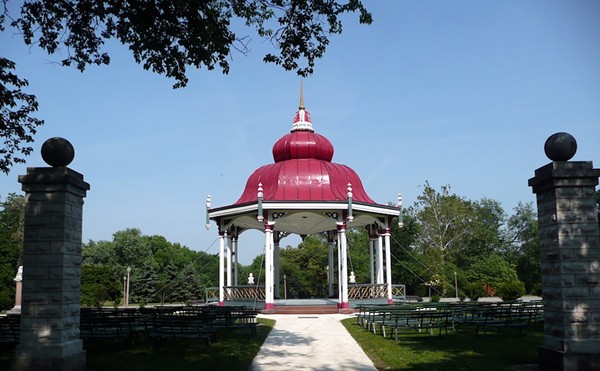The bus will reach its final destination, a small town just north of Mexico City, in about 36 hours. Used to be that Rivera could let his travelers out to stretch their legs and get a bite to eat on Cherokee -- but not anymore. The locals are raising a ruckus, so now Rivera will be stopping at a Burger King in Sunset Hills before winding south toward Texas.
Along the way, the passengers will enjoy a Mexican comedy called Dios los Cría, which, Rivera explains, involves the wacky antics of two brothers who decide to trade places.
The bus company, Transportes Regiomontanos, has been operating for fifteen years and has been coming through St. Louis for the past five. The Houston-based firm operates eight buses and two routes. Rivera says it provides an invaluable service to Mexican people living here.
"Our people are afraid to go on Greyhound," he explains. "They don't speak English, so they worry they'll go to the wrong place or lose their luggage."
But to the local, Anglo business establishment, the bus has no place on Cherokee. They say it operates without a permit, knocks down overhanging trees and has no place to park -- never mind the lack of proper bathroom facilities.
The conflict epitomizes growing tensions between white and Hispanic business owners who share the street. Since the early '90s, a Mexican commercial district has blossomed along Cherokee on blocks west of South Jefferson Avenue.
The most vocal opponent of the bus' presence on Cherokee is Shirley Wallace, president of the Cherokee Station Business Association. She's gone as far as spending hours waiting for the coach to arrive so she could snap pictures of the vehicle and its passengers.
"If you come from another country and things weren't going well, and you're coming here for a better life, why wouldn't you try it our way?" Wallace asks.
The Transportes Regiomontanos bus didn't come to Cherokee Street until last year, when it began picking up passengers who bought their tickets at a restaurant and grocery store called El Caporal and embarked in the nearby Salvation Army parking lot.
The business association complained, saying that the store didn't have a permit to operate as a bus stop. (These days, the bus arrives four times a week.)
So owner Rangel D. Lazaro applied for one. The St. Louis Board of Public Service denied the request, stating: "The use will be detrimental to the public health, safety, morals and general welfare," and "will have a negative impact on the adjacent uses or community facilities."
Not long after, El Carporal shut down, and the bus briefly bypassed the Cherokee stop. "I guess he got tired of us hassling him," Wallace says.
Earlier this year Carlos Dominguez, who runs the nearby Carnicería Latino Americana, decided to take over the ticket-selling business. Dominguez would make a $15 commission from Transportes Regiomontanos for each ticket sold. But more than that, he says, he saw a need from local residents and thought local commerce would be served as well.
"The people from Chicago, they're hungry. They want to eat something," says Dominguez. "They could go to any restaurant around here."
This was not lost on Wallace, so she decided to document the infraction. On a recent Saturday night she parked her car and snapped pictures of the bus pulling up at California and Cherokee.
Alderman Craig Schmid, whose 20th Ward encompasses the Cherokee block, says he is unaware of the bus service's return. If it has come back, he says, it should be shut down.
"It's really not a bus depot," says Schmid. "There's not an appropriate location for the bus to park and disembark passengers, get food, drink, hang out and use bathroom facilities. It's just overloading the wrong place at the wrong time. If I were [Dominguez], I would simply abide by the law so that he's not having that scrutiny."
Dominguez concedes he does not have a permit, which costs $2,000 per year. Still, he points out that private buses continually drop off and pick up loads of passengers at the nearby Casa Loma Ballroom.
"I think it's pretty obvious what the difference would be," counters Schmid. "It's a large venue where people are let off, and then the buses have a place to park, or they leave. It's not something where people are coming in as a bus depot."
Transportes Regiomontanos' buses stop at dozens of cities in the United States, but St. Louis appears to be one of only a few that require a permit, says Audy Campa, supervisor of the company's eastern line.
"We have permits to stop in Chicago, but not anywhere else," Campa adds.
There have been no problems reported in Fairmont City, Illinois, the last stop before St. Louis.
"We don't see any regulation in Illinois that would regulate where the bus stops," says Fairmont City police chief and village administrator Scott Penny. "And we've not had any complaints by individual property owners that the bus stopped and somehow created a problem at the different locations."
Frank Michel, a spokesman for Houston mayor Bill White, says his city does not require special permits for bus stops, but he says that the stops may be subject to safety inspections by the State of Texas.
Meanwhile, relations between Cherokee's Hispanic and Anglo communities remain chilly.
"For some reason, they try to separate themselves. They want their own Hispanic business district, which you know is never going to work," says Karen Abounader, owner of Proper Shoe Store at 2712 Cherokee. "You have to work as a team to get anything done."
But Dominguez says he just wants everyone to get along.
"We're building something out of nothing. A street that was down, we built something there. We pay taxes. We don't want to commit crimes. We're just hard-working people. I'm just here to do a living. I want to sit down and work it out with the business association."






